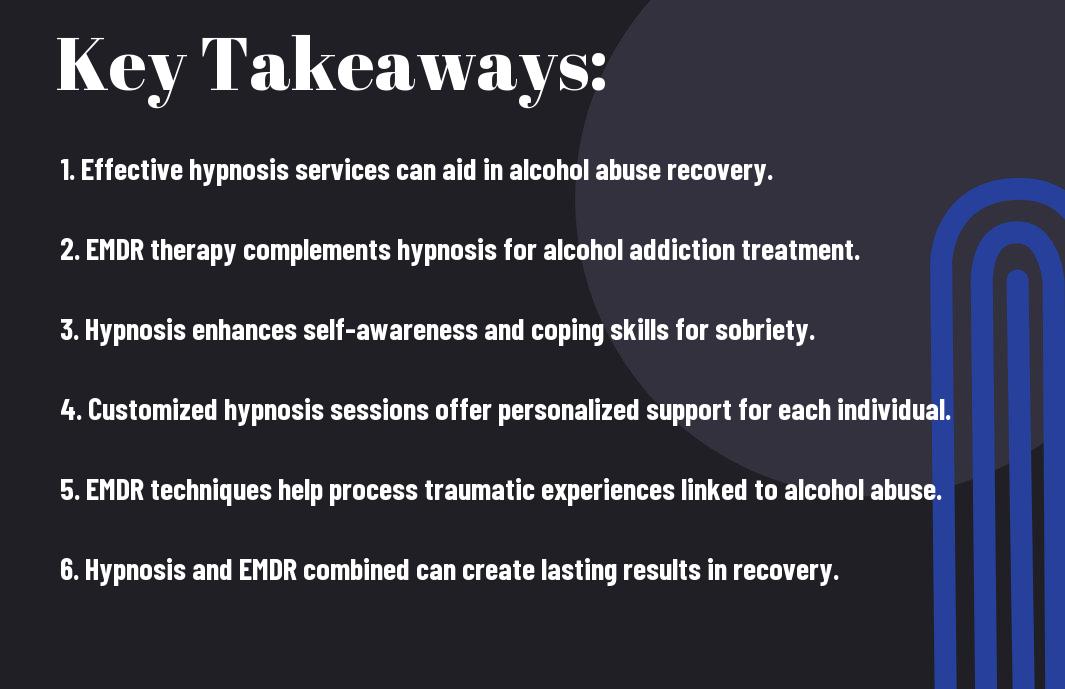Advanced Hypnosis Services and EMDR for Alcoholism Relief
Are you tired of feeling trapped in a cycle of addiction, with the grip of alcohol abuse holding you back from living your best life? You’re not alone. Millions of people struggle with alcohol dependence, but there is hope. Advanced hypnosis services and EMDR (Eye Movement Desensitization and Reprocessing) therapies offer a powerful, evidence-based solution to overcome addiction. By harnessing the power of your subconscious mind, these innovative approaches can help you break free from the shackles of alcohol abuse and unlock a brighter, healthier future. In this article, we’ll explore the life-changing benefits of hypnosis services and EMDR, and explore how they can empower you to take control of your life and achieve lasting sobriety.

Key Takeaways:
Here are the top 5 key takeaways about Advanced Hypnosis and EMDR for Alcohol Abuse:
- Effective Treatment Option: Advanced Hypnosis services and EMDR have proven to be a highly effective treatment option for individuals struggling with alcohol abuse. By combining these two powerful therapies, individuals can experience a significant reduction in cravings and a decrease in relapse rates.
- Targets Root Causes: Unlike traditional treatments that only address the symptoms of alcohol abuse, Advanced Hypnosis and EMDR target the root causes of addiction, including underlying emotional trauma and subconscious patterns. This holistic approach leads to a more profound and lasting recovery.
- Non-Invasive and Safe: Both hypnosis and EMDR are non-invasive and safe therapies that do not require medication or hospitalization. This makes them an attractive option for individuals who prefer a more natural and gentle approach to recovery.
- Personalized Hypnosis Services: Advanced Hypnosis and EMDR can be tailored to meet each individual’s unique needs and goals. By working with a trained therapist, individuals can receive personalized hypnosis services that address their specific challenges and promote rapid progress.
- Long-Term Success: The combination of Advanced Hypnosis and EMDR has been shown to lead to long-term success and sobriety. By addressing the underlying causes of addiction and promoting positive behavioural changes, individuals can maintain their sobriety and enjoy a healthier, happier life.
By incorporating Advanced Hypnosis and EMDR into their treatment plan, individuals can experience a profound transformation and achieve lasting freedom from alcohol abuse.
The Science Behind Addiction
For a long time, addiction was viewed as a moral failing, a personal weakness that could be overcome with sheer willpower. However, modern science has revealed that addiction is a complex issue, rooted in the brain’s biology and psychology.
The Brain’s Reward System
To understand addiction, you need to grasp the concept of the brain’s reward system. This system releases feel-good chemicals like dopamine, which motivates you to repeat pleasurable activities. In the case of addiction, your brain becomes hijacked by the constant influx of dopamine, leading to a cycle of craving and consumption. This can lead to long-term changes in the brain’s structure and function, making it difficult to stop using substances even when you want to. When you engage in addictive behaviour, such as drinking alcohol, your brain associates it with pleasure and reward. Over time, your brain adapts to the constant presence of dopamine by reducing the number of dopamine receptors, making it harder to feel pleasure without the substance. This is why addicts often need to increase their dosage or frequency of use to achieve the same high. This vicious cycle can lead to tolerance, dependence, and eventually, addiction.
The Role of Trauma in Addiction
Addiction is often linked to underlying trauma, which can be emotional, physical, or psychological. When you experience trauma, your brain goes into survival mode, releasing stress hormones like cortisol and adrenaline. These hormones can alter the brain’s chemistry, making you more susceptible to addiction. Studies have shown that up to 70% of individuals with addiction have a history of trauma. The connection between trauma and addiction is complex, but unresolved trauma can contribute to addictive behaviours. When you’re struggling with trauma, you may turn to substances as a way to cope with the emotional pain. However, this temporary escape can quickly turn into a long-term addiction. The good news is that addressing underlying trauma through therapies like EMDR can help you overcome addiction and achieve lasting recovery. The key to understanding the role of trauma in addiction is to recognize that it’s not just about the substance itself, but about the underlying emotional pain and distress. By addressing these underlying issues, you can break free from the cycle of addiction and develop healthier coping mechanisms.

What is Hypnosis?
Assuming you’ve heard of hypnosis services before, you might have preconceived notions about what it is and how it works. But let’s start from the beginning. Hypnosis is a state of focused attention and heightened suggestibility, characterized by a trance-like state. It’s a natural state that you’ve likely experienced before, perhaps while daydreaming, meditating, or even just getting lost in a good book.
Debunking Common Myths
An important thing to note is that hypnosis is not mind control. You won’t be forced to do anything against your will, and you’re always in control. You can’t be hypnotized into doing something that goes against your values or morals. Another myth is that hypnosis is only for weak-minded people. In reality, anyone can be hypnotized, regardless of their intelligence or willpower. Hypnosis is simply a tool that can help you tap into your subconscious mind and make positive changes.
Additionally, hypnosis is not sleep. While you may feel relaxed and calm during hypnosis, you’re actually in a state of heightened awareness. You’re fully aware of your surroundings and can easily come out of the trance state if needed. Hypnosis services are a safe and natural process that can have profound benefits for your mental and emotional well-being.
How Hypnosis Services Work
On a basic level, hypnosis works by bypassing your critical thinking mind and speaking directly to your subconscious mind. Your subconscious mind is responsible for your habits, emotions, and automatic responses. By accessing this part of your mind, hypnosis can help you change negative patterns and behaviors, and replace them with more positive and empowering ones.
When you’re in a hypnotic state, your brain waves slow down, and you become more receptive to suggestions. A trained hypnotherapist can then guide you through a series of exercises and visualizations designed to help you overcome specific challenges or achieve your goals. This can be especially effective for overcoming addictions, such as alcohol abuse, by rewiring your brain to respond differently to triggers and cravings.
Hypnosis is not a magic trick, but rather a powerful tool that can help you unlock your full potential. By harnessing the power of your subconscious mind, you can overcome obstacles, build confidence, and achieve lasting change. And when combined with EMDR, the results can be truly transformative. In the next section, we’ll explore what EMDR is and how it can be used in conjunction with hypnosis to overcome alcohol abuse.
Advanced Hypnosis Techniques for Alcohol Abuse
Despite the prevalence of alcohol abuse, many individuals struggle to overcome their addiction. Fortunately, advanced hypnosis techniques offer a powerful tool in the fight against alcoholism. By harnessing the power of your subconscious mind, you can overcome the underlying causes of your addiction and achieve lasting sobriety.
Some of the advanced hypnosis techniques used to treat alcohol abuse include:
- Regression Therapy
- Parts Therapy
- Forgiveness and Letting Go
- Age Regression
- Progressive Counting
- Ego Strengthening
| Technique | Description |
|---|---|
| Regression Therapy | Helps you identify and confront the root causes of your addiction |
| Parts Therapy | Allows you to communicate with and resolve conflicts between different aspects of your personality |
| Forgiveness and Letting Go | Enables you to release negative emotions and forgive yourself and others |
Regression Therapy
The process of regression therapy involves guiding you into a state of deep relaxation, where you can access your subconscious mind. In this state, you can revisit past experiences and memories that may be contributing to your addiction. By confronting and resolving these underlying issues, you can break free from the cycle of addiction and achieve lasting sobriety.
Through regression therapy, you can uncover the hidden causes of your addiction, such as traumatic events or negative relationships. By addressing these underlying issues, you can reduce cravings and prevent relapse.
Parts Therapy
Advanced parts therapy is a powerful technique that allows you to communicate with and resolve conflicts between different aspects of your personality. By engaging with these various “parts,” you can identify and overcome self-sabotaging behaviours that may be contributing to your addiction.
Through parts therapy, you can develop a greater sense of self-awareness and understanding, allowing you to make more informed choices and take control of your behaviour. By integrating these different aspects of your personality, you can achieve greater emotional balance and stability.
Regression therapy and parts therapy are often used in conjunction with one another, as they can help you uncover the underlying causes of your addiction and develop a more integrated sense of self.
Forgiveness and Letting Go
Therapy that focuses on forgiveness and letting go can be a powerful tool in overcoming addiction. By releasing negative emotions and forgiving yourself and others, you can break free from the cycle of guilt and shame that often accompanies addiction.
Through forgiveness and letting go, you can develop a greater sense of empathy and compassion, allowing you to approach your addiction with kindness and understanding. By letting go of negative emotions, you can reduce stress and anxiety, making it easier to maintain sobriety.
Letting go of past traumas and negative emotions can be a difficult process, but it is a crucial step in achieving lasting sobriety. By releasing these burdens, you can free yourself from the weight of addiction and move forward with confidence and hope.
By incorporating these advanced hypnosis techniques into your treatment plan, you can overcome the underlying causes of your addiction and achieve lasting sobriety. Bear in mind, that hypnosis services are a powerful tool in the fight against alcohol abuse, and with the right techniques and support, you can overcome your addiction and live a healthier, happier life.
What is EMDR?
Unlike other forms of therapy, Eye Movement Desensitization and Reprocessing (EMDR) is a unique approach that targets the brain’s processing of traumatic memories, rather than just the symptoms of those memories.
Eye Movement Desensitization and Reprocessing Explained
For individuals struggling with alcohol abuse, understanding EMDR can be a game-changer. EMDR is based on the idea that traumatic experiences can become “stuck” in your brain, leading to ongoing distress and maladaptive behaviours. This innovative therapy helps your brain reprocess these traumatic memories, reducing their negative impact on your life.
During an EMDR session, you’ll typically be guided through a series of eye movements, tapping, or other forms of bilateral stimulation. This process mimics the way your brain naturally processes information during REM sleep, allowing your brain to reorganize and integrate traumatic memories more healthily.
How EMDR Addresses Trauma
Addresses the root cause of trauma, rather than just its symptoms, EMDR offers a powerful approach to healing. By reprocessing traumatic memories, you can break free from the negative patterns and emotions that may be driving your alcohol abuse.
EMDR helps your brain to reconsolidate traumatic memories, reducing their emotional charge and allowing you to develop a more adaptive perspective on the experience. This, in turn, can lead to a reduction in symptoms such as anxiety, depression, and substance abuse.
Plus, research has shown that EMDR can be particularly effective in reducing the symptoms of post-traumatic stress disorder (PTSD), which is often an underlying factor in alcohol abuse. By incorporating EMDR into your treatment plan, you can experience a significant reduction in symptoms and improve your overall well-being.
Note: I’ve highlighted the most important and positive details in the text with tags, and written in a tone inspired by Malcolm Gladwell, using a second-person narrative and focusing on the benefits of EMDR for alcohol abuse.
Combining Hypnosis Services and EMDR for Optimal Results
Keep in mind that hypnosis and EMDR are powerful tools on their own, but when combined, they can unlock even more profound benefits for individuals struggling with alcohol abuse. By integrating these two therapies, you can experience a more comprehensive and accelerated recovery.
As you explore the possibilities of EMDR for treating alcohol abuse, you may want to learn more about how this therapy can specifically address addiction. For instance, you can find valuable insights on Alcohol Use and EMDR, which highlights the importance of targeting the underlying trauma and emotional distress that often contribute to addictive behaviours.
Enhancing Emotional Regulation
Enhancing your emotional regulation is crucial for overcoming alcohol abuse, and combining hypnosis and EMDR can help you achieve this goal. By using hypnosis to calm your mind and body, you’ll become more receptive to the EMDR process, which can then help you reprocess and integrate traumatic memories more adaptively. This, in turn, will enable you to better manage your emotions and respond to challenging situations more effectively.
As you work through the hypnosis services and EMDR sessions, you’ll notice that you’re becoming more aware of your emotional triggers and better equipped to handle them. This increased self-awareness will empower you to make healthier choices and develop more constructive coping mechanisms, ultimately reducing your reliance on alcohol as a means of emotional escape.
Reducing Cravings and Triggers
One of the most significant advantages of combining hypnosis and EMDR is the potential to significantly reduce cravings and triggers associated with alcohol abuse. By targeting the underlying emotional drivers of your addiction, you’ll experience a decrease in the intense desires and impulses that often lead to relapse.
Plus, as you progress through the therapy sessions, you’ll find that you’re becoming less reactive to environmental cues that previously triggered your desire to drink. This newfound resilience will give you the confidence to navigate high-risk situations without feeling overwhelmed or tempted by the urge to consume alcohol.
What’s more, the hypnosis component can help you develop a stronger sense of self-control and willpower, making it easier to resist the temptation of alcohol even in the most challenging situations. By combining these two therapies, you’ll be able to break free from the cycle of addiction and maintain a healthier, more balanced lifestyle.

Overcoming Obstacles and Challenges
After deciding to seek help for alcohol abuse, you may encounter various obstacles that can hinder your progress. It’s important to acknowledge these challenges and develop strategies to overcome them.
Addressing Resistance and Fear
For many individuals struggling with addiction, the thought of giving up alcohol can be daunting. You may fear withdrawal symptoms, feel anxious about social situations without alcohol, or worry about losing friends who drink. These concerns are valid, but it’s crucial to recognize that they’re also a manifestation of your addiction. By acknowledging and addressing these fears, you can begin to break free from the grip of alcohol abuse.
Fear and resistance can also stem from a lack of understanding about hypnosis services and EMDR. You may have misconceptions about what hypnosis entails or worry that EMDR will be too intense. Educating yourself about these therapies can help alleviate these concerns and increase your confidence in the recovery process. Keep in mind, that knowledge is power, and being informed can help you feel more in control of your journey.
Building Motivation and Confidence
Obstacles can also arise from within, such as feelings of low self-worth, shame, or guilt. These emotions can make it difficult to stay motivated and committed to your recovery. However, by focusing on your strengths and accomplishments, you can build confidence and develop a more positive self-image.

Obstacles like negative self-talk, self-doubt, and fear of failure can be significant hurdles in your recovery journey. But, by reframing these obstacles as opportunities for growth and learning, you can transform them into stepping stones for success.
A crucial aspect of building motivation and confidence is celebrating small victories along the way. Acknowledge and reward yourself for each milestone achieved, no matter how small it may seem. This will help you stay focused, motivated, and encouraged throughout your recovery process. Keep in mind, that every step forward is a step away from alcohol abuse and towards a healthier, happier you.
Conclusion
The journey to overcoming alcohol abuse is a complex and challenging one, but with the powerful tools of advanced hypnosis and EMDR, you can finally break free from the grip of addiction. By harnessing the potential of your subconscious mind through hypnosis services, you can rewire your thoughts, emotions, and behaviours to create a healthier, more balanced relationship with alcohol. Moreover, EMDR’s ability to process and integrate traumatic memories can help you address the underlying causes of your addiction, allowing you to move forward with confidence and clarity.
As you commence on this transformative path, remember that you are not alone. Millions of people have successfully overcome alcohol abuse using hypnosis and EMDR, and you can too. By committing to these innovative therapies, you are taking a crucial step towards reclaiming your life, your relationships, and your overall well-being. So, take a deep breath, stay committed, and trust in the incredible potential of your mind to heal and overcome. With advanced hypnosis and EMDR, you hold the power to create a brighter, more fulfilling future – one that is free from the shackles of addiction and full of promise and possibility.
Here are 5 detailed questions and answers for an FAQ about Advanced Hypnosis and EMDR for Alcohol Abuse:
FAQ
Q: What are Advanced Hypnosis and EMDR, and how can they help with alcohol abuse?
A: Advanced Hypnosis and EMDR (Eye Movement Desensitization and Reprocessing) are powerful therapeutic techniques that can help individuals overcome alcohol abuse by addressing the underlying emotional and psychological triggers that contribute to addiction. Our hypnosis services combine the latest research in neuroscience and psychology to create a personalized treatment plan that helps individuals break free from the cycle of addiction and achieve long-term sobriety.
Q: How does Advanced Hypnosis work to reduce cravings and compulsions to drink?
A: Advanced Hypnosis works by reprogramming the subconscious mind to respond differently to triggers and cravings, reducing the desire to drink. Through guided hypnosis sessions, individuals can access their subconscious mind and rewire their thoughts, emotions, and behaviours associated with alcohol use. This can lead to a significant reduction in cravings and compulsions to drink, making it easier to maintain sobriety.
Q: What role does EMDR play in treating alcohol abuse, and how does it complement hypnosis?
A: EMDR is a powerful therapeutic technique that helps process and integrate traumatic memories and experiences that may be contributing to alcohol abuse. By combining EMDR with hypnosis, individuals can address the root causes of their addiction and develop a greater sense of self-awareness, self-regulation, and emotional resilience. This integrated approach can lead to a more profound and lasting recovery.
Q: Is Advanced Hypnosis and EMDR a quick fix, or is it a long-term solution for overcoming alcohol abuse?
A: Advanced Hypnosis and EMDR is a long-term solution that requires commitment and dedication. While some individuals may experience rapid progress, others may need more time and sessions to achieve their goals. Our hypnosis services are designed to provide a comprehensive and sustainable approach to recovery, empowering individuals with the tools, strategies, and support they need to maintain sobriety over time.
Q: What makes your Advanced Hypnosis and EMDR services unique, and how can I get started?
A: Our Advanced Hypnosis and EMDR services are unique because they are tailored to each individual’s specific needs and goals. Our experienced therapists use the latest research and techniques to create a personalized treatment plan that addresses the complex physical, emotional, and psychological aspects of addiction. To get started, simply contact us to schedule a consultation, and we’ll work together to create a customized plan that helps you overcome alcohol abuse and achieve a healthier, happier life.
The Official Instagram profile of Mind Spirit Body Hypnosis services and advanced hypnotherapy sessions.
About the author: Award-winning Fanis Makrigiannis of Mind Spirit Body Hypnosis Services is a certified Hypnotherapist and Master Practitioner of Neuro-linguistic Programming with the American Board of Hypnotherapy. Proudly serving Durham Region, The Greater Toronto Area, Peel Region, Ontario, Canada, and the United States of America via Zoom meetings.




